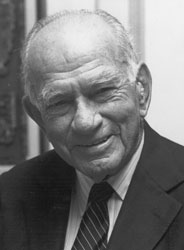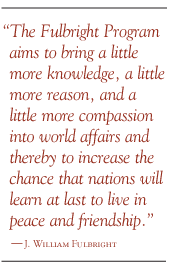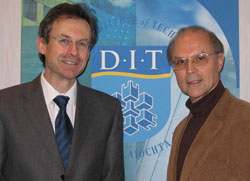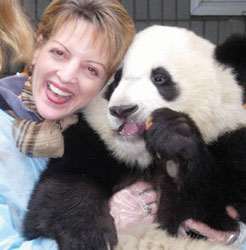|
By Jamie L. Freedman
It’s an extraordinary story of global
cooperation. Over the past six decades, a quarter of a million
students and scholars from every corner of the earth have
forged close personal, professional, and academic ties with
one another through the Fulbright Program. Established to
promote “mutual understanding between the people of the
United States and the people of other countries,” the
program has captured the imagination of scholars throughout
the world.
GW’s deep and multifaceted connection
to the renowned international exchange program goes back to
the program’s prominent founder, the late J. William
Fulbright, LLB ’34, LLD ’59. As a GW Law student,
the future five-term U.S. senator earned straight A’s,
finishing second in his 1934 graduating class. Fulbright taught
briefly at the Law School before returning home to Arkansas
to embark on his public service career.
At the conclusion of World War II, the young
senator shepherded a bill through Congress to establish a
government-funded international exchange program aimed at
promoting global good will through the exchange of people,
knowledge, and skills. The flagship program that bears his
name was signed into law by President Truman in 1946, and
the first Fulbright scholars went overseas in 1948. Now approaching
its 60th anniversary, the Fulbright Program links the people
of the United States with their academic and professional
counterparts throughout the world, paying huge dividends in
the form of international friendships and global harmony.


|
The program now operates in 140 countries
worldwide and boasts more than 260,000 alumni—including
some 100,000 Americans who have studied, taught, or conducted
research abroad and more than 160,000 scholars from other
countries who have engaged in similar activities in the United
States. Sponsored by the U.S. Department of State’s Bureau
of Educational and Cultural Affairs, the Fulbright Program
awards 4,500 grants annually based on academic or professional
achievement and leadership potential. GW has participated
actively in the Fulbright Program over the years, sending
impressive numbers of students and faculty members around
the globe to exchange ideas and develop joint solutions to
common concerns. The University also has hosted hundreds of
visiting international Fulbright scholars, bringing an average
of 10 Fulbrighters to Foggy Bottom annually in recent years.
This year, three GW faculty members received
prestigious Fulbright Scholarships, joining some 800 U.S.
academics and practitioners traveling worldwide for the 2004-05
academic year through the Fulbright Program. One of the faculty
members, Associate Professor of Geology Christopher M. Fedo,
will soon be departing for Stockholm, where he plans to spend
four months examining the earliest surface conditions on Earth
in collaboration with the Swedish Museum of Natural History.
“I’m incredibly excited about having the opportunity
to go abroad and be an ambassador for my science and for our
country, and I am looking forward to working with internationally
recognized colleagues from around the world,” Fedo says.
“The Fulbright will help me obtain a better understanding
of the conditions under which life emerged here on earth,
as well as look at the possibility of whether life exists
somewhere else in the solar system. I’m incredibly thrilled
at having been selected.”
GW’s two other 2004-05 faculty Fulbright
winners, Professor of Tourism Studies Douglas C. Frechtling
and Associate Professor of Marketing Amy K. Smith, completed
their Fulbrights just prior to press time and were pleased
to share their highlights and insights with GW Magazine.
Frechtling returned to GW in January after
spending five months in Ireland as a Fulbright Scholar at
the Dublin Institute of Technology School of Hospitality Management
and Tourism. “It was rewarding to receive external recognition
of my accomplishments and to have the chance to help colleagues
at an institution outside the United States,” says Frechtling,
who chose to work at DIT—home to Ireland’s largest
hospitality management and tourism program—after giving
an address there on tourism forecasting in 2002.
In Dublin, Frechtling mentored faculty members
and helped them prepare manuscripts for publication in refereed
academic journals, presented seminars on tourism research
methodologies for master’s and doctoral research students,
and gave guest lectures to undergraduates on the economic
impact of tourism. The two-time chair of GW’s Department
of Tourism and Hospitality Management also worked with the
faculty on research projects and led workshops on tourism
and hospitality management trends, issues, and solutions.

During his Fulbright visit, GW tourism professor Douglas
C. Frechtling (right), met with Michael Mulvey, the
director of the faculty of tourism and food at the Dublin
Institute of Technology, to discuss their report on
a new marina in Galway Harbour.
|
An equally satisfying component of Frechtling’s
Fulbright grant involved teaming up with Ireland West Tourism,
a government financed regional tourism program, on a number
of interesting projects, including a pre-feasibility study
on building a marina in Galway Harbor. “I’ll be
returning to Ireland from time to time to continue working
with Ireland West Tourism, as well as with professors who
are in the process of publishing articles in refereed academic
journals,” Frechtling says. This continuing relationship,
he says, is “truly in the spirit of Fulbright.”
The experience was a real highlight of Frechtling’s
career. “Not only did I have the opportunity to live
in a different country for the first time but to understand
firsthand the unique challenges and issues of living in a
relatively small island nation in contrast to our very large
continental nation,” he says. “It was a wonderful
opportunity, and I took a great deal away with me.”
Associate marketing professor Amy K. Smith
was drawn to the idea of a Fulbright for similar reasons.
Growing up on a farm in rural Pennsylvania, she and her family
had little time for vacations, rarely venturing farther afield
than bordering states. “This fueled my desire to see
new places and experience different cultures,” she says.
Smith’s Fulbright grant took her to
the Southwest University of Finance and Economics in Chengdu,
Sichuan Province, People’s Republic of China, where she
taught graduate courses in marketing management and services
marketing. She also participated in the Fulbright intracountry
lecturing program, giving lectures in many cities throughout
China, including Guangzhou, Xi’an, and Shanghai to students,
the university faculty, and the staff.
Now completing the remainder of her sabbatical
year as a visiting research fellow at the University of Queensland
in Brisbane, Australia, Smith shared highlights of her Fulbright
experience with us from “down under.” China, she
says, was always near the top of her “most wanted”
travel list. “I have long been fascinated by how China’s
history, tradition, and culture shaped its management philosophies
and business practices,” she says. “Because of China’s
recent entry into the World Trade Organization and the fact
that it is projected to account for 25 percent of the total
world economy by 2025, I am keenly interested in how the country
will navigate the economic challenges and societal transformations
that are likely to accompany such opportunity and growth.”

Marketing Professor Amy K. Smith with a new friend
in Chengdu, China. Located in the Sichuan province,
Chengdu is known as the home of the giant panda. A panda
reserve and breeding center are located there.
|
Smith, whose Fulbright project focused on
“Helping China’s Future Business Leaders Build Marketing
Management Foundations,” was the first Fulbrighter to
be hosted by her Chinese university. “My goal was to
help China’s future business leaders be able to fully
participate and actively compete in the global marketplace
by teaching them about the marketing management strategies,
tools, and tactics used by their Western counterparts,”
she says. “The symbiotic and synergistic relationship
that continues to develop between the U.S. and China markets
makes mutual understanding of business approaches and marketing
techniques both highly relevant and critically important.”
One of the many highlights of Smith’s
experience was her Chinese students’ “absolute enthusiasm,
their extreme eagerness to learn, their utmost respect and
appreciation for education, and their willingness to work
very hard.” She was particularly moved by their reaction
to the Fulbright-funded textbooks that she gave them. “When
I handed them out the first day of class, it was if I had
given them a bar of gold!” she recalls. “They were
utterly thrilled and treated their textbooks like a prized
possession.”
Smith says that she developed many close
friendships in China with colleagues and students alike. “I
promised some of my students that I would return in the summer
of 2006 for their graduation,” she says.
Overall, the experience helped advance both
her academic career, as well as her personal horizons. “Serving
as a Fulbright Lecturer at a Chinese university improved my
scholarly development and professional effectiveness by providing
me with international experience as an educator,” she
says. “I gained knowledge and experience that will help
me to bring new ideas and broader perspectives to the classroom
and that will provide me with the opportunity to expand my
research to international markets.”
Rounding out this year’s GW Fulbright
delegation are eight U.S. Student Fulbright Awardees. They
are: Julia M. Booth, BS ’04, who is studying information
technology development and access in Morocco; Charita L. Castro,
a doctoral candidate in public policy candidate at GW who
is studying public health in the Philippines; Nathan L. Converse,
BA ’01, an MA in international affairs candidate at GW
who is studying anthropology in Ecuador; Nichole L. Devries,
BA ’04, who is teaching English in Indonesia; Kristin
Eckert, BA ’04, who is studying European Union/Latin
American relations in Germany; Kate E. Hill, BA ’04,
who is focusing on women’s studies in Vietnam; Kelly
J. Keehan, BA ’04, who is teaching English in northern
Taiwan, and Nicole S. Petsel, BA ’98, a GW international
affairs graduate student who is studying Middle Eastern languages
and literature in Egypt.
This year’s Fulbright scholars join
a veritable army of GW community members who have been honored
with Fulbrights over the decades (see sidebar).
GW Alumni and Students Who Have Received Fulbright Grants
1990-2005*
1990-1991
Barbara Balaj-West, MA ’83, PhD ’97,
international affairs, Germany
Stephen Liebowitz, Spain
Tim Sisk, PhD ’92, political science,
South Africa
1992-1993
Maria Carillo, JD ’92, law, Dominican
Republic
Peter Dernbach, BA ’92, business/management,
Singapore
Deanna Glickman, BA ’92, Western
European politics, Germany
Christine Keating, MA ’93, women’s
studies, Sri Lanka
Kelly Nelson, MPhil ’98, economics,
Singapore
Sonja Petersen, MA ’93, international
relations, Philippines
Mary Scalia, teaching English as a foreign
language, Germany
1993-1994
Kathleen Finn, economics, Benin
Kristin R. McArdel, BA ’92, history,
Australia
Bridget A. Williams, MA ’93, East
Asian/Pacific/Australian studies, Hong Kong
1994-1995
Eliot M. Goldberg, MA ’96, Middle
Eastern languages and literature, Jordan
Amy B. Schmidt, BA ’94, Middle Eastern
languages and literature, Jordan
1995-1996
Melanie A. Bielefeld, BA ’95, agriculture,
Tanzania
Deirdre A. Gibbons, education, Iceland
Kevin M. Kreutner, BA ’95, MA ’99,
MBA ’99, Middle Eastern history, Qatar
Alexander D. Mundt, BA ’95, political
science, Uganda
Debra M. Sohm, BA ’95, ecology/environmental
studies, Ghana
1996-1997
Gregg C. Bucken-Knapp, PhD ’99,
comparative politics, Norway
Bryan R. Daves, MA ’91, Jordan
Frances J. Laidlaw, DSc ’96, engineering,
France
Lionel M. Lavenue, MS ’94, Germany
Rashid Miraj, MA ’96, Mauritius
Nicholle K. Warner, MA ’95, international
relations, Austria
1997-1998
Ereney A. Hadjigeorgalis, MA ’92, Chile
Sara K. Rankin, BA ’96, Germany
Sharon E. Rogers, MA ’96, women’s
studies, Nicaragua
Karen M. Van Eerden, BA ’95, Germany
Kristen M. Walker, BA ’97, anthropology,
Chile
1998-1999
Clarissa S. Adamson, MA ’97, MPhil
’98,PhD ’04, anthropology, Indonesia
Xavier Beltran, MA ’98, Western European
politics, Spain
Sabina A. Crisen, MA ’98, Eastern
European history, Romania
Tracy E. Sayegh, BA ’98, economic
development, Syria
1999-2000
Brian J. Finnegan, PhM ’98, Latin
American and Caribbean studies, Chile
Susana Molins-Lliteras, BA ’99,
literature, Morocco
2000-2001
Annie H. Nguyen, BA ’00, creative
writing, Vietnam
Catherine C. Nielsen, MA ’01, history,
Austria
Jeremy R. Strozer, BA ’98, MA ’00,
international relations, Belgium
Thomas W. Walsh, BA ’99, ecology/environmental
studies, Ecuador
2001-2002
Adam B. Carter, MA ’01, international
relations, Spain
Margalit T. Murray, MA ’01, Middle
Eastern politics, Kuwait
William F. Pore, East Asian/Pacific/Australian
history, Vietnam
Sergio D. Yanes, BS ’99, MS ’01,
business/management, Mexico
2002-2003
John L. Clark, botany, Ecuador
Jessica D. Lieberman, political science,
Jordan
Alexis L. Major, BA ’01, anthropology,
India
Kathryn A. Rhine, BA ’02, public
health, Nigeria
2003-2004
Gregory F. Domber, Eastern European history,
Poland
John A. Donaldson, political science,
China
Lee Ann Fujii, political science, Rwanda
Stephanie L. McNulty, political science,
Peru
Keith A. Zielenski, MS ’03, engineering
management, Germany
2004-2005
Julia M. Booth, BS ’04, information
sciences/systems, Morocco
Charita L. Castro, public health, Philippines
Nathan L. Converse, BA ’01, anthropology,
Ecuador
Nichole L. Devries, BA ’04, teaching
English as a foreign language, Indonesia
Kate E. Hill, BA ’04, women’s
studies, Vietnam
Kelly J. Keehan, BA ’04, teaching
English as a foreign language, Taiwan
Nicole S. Petsel, BA ’98, Middle
Eastern languages and literature, Egypt
*While the Fulbright program existed and
GW students participated in the program for many years prior,
complete records do not exist for participants before 1990.
Back to top | Spring/Summer
2005 Table of Contents
|